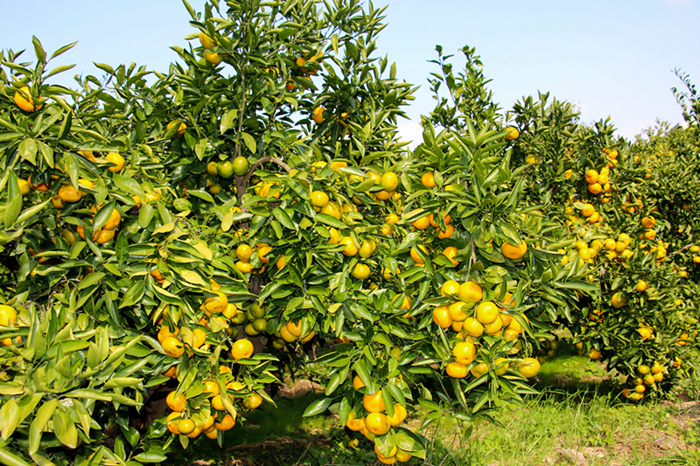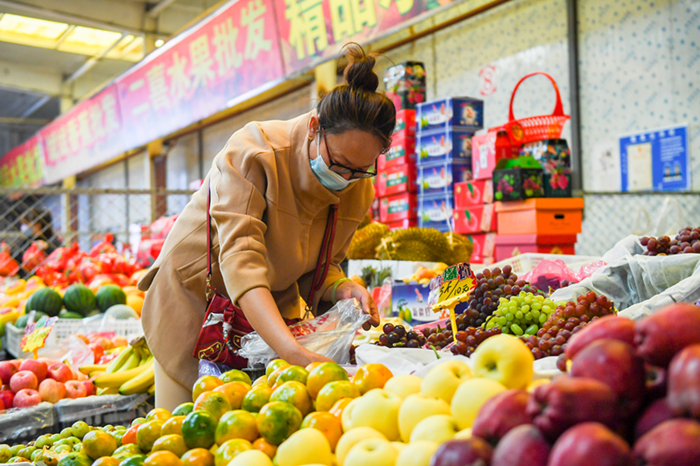|
||||||||||
| Home Nation World Business Opinion Lifestyle ChinAfrica Multimedia Columnists Documents Special Reports |
|
||||||||||
| Home Nation World Business Opinion Lifestyle ChinAfrica Multimedia Columnists Documents Special Reports |
| ChinAfrica |
| A Sweet Deal |
| Zimbabwe gets the green light to export citrus fruits to China |
| Reporting from Zimbabwe Problem Masau 丨VOL. 14 October 2022 ·2022-09-22 |

Citrus fruits have a big demand in the Chinese market (XINHUA)
Eight years ago, Chiredzi-based subsistence farmer Musa Moyo planted citrus trees in the hope that after five years he could sell the fruit and use the money to pay school fees for his seven children.
“I planted 600 orange trees on my plot. I would religiously weed and water them in the hope that one day I would benefit from the labour of my sweat,” he said.
Moyo had to wait until 2020 when the trees began showing signs of bearing fruit.
“Naturally, I was excited by the prospect of finally selling my fruit. I had done everything our agricultural extension officers had taught me and was convinced that I was going to produce some of the best fruit in the country,” he said.
However, with the advent of the COVID-19 lockdown in 2020, Moyo had to look on helplessly as his produce began rotting in the field.
Realising that he had no market to sell locally, he tried to team up with other local farmers so that they could export their produce to South Africa.
“It was a futile exercise because there are many laws that govern the export of fruit,” he said.
Hope at hand
However, Moyo is one of the farmers who have seen their renewed hope earlier this year when the government of Zimbabwe signed a memorandum of understanding with China to export citrus fruits to the Asian giant.
Now, as China’s appetite for Zimbabwean agricultural products grows, the General Administration of Customs of China issued an announcement this July, giving the green light to importation of fresh citrus from Zimbabwe that meets relevant phytosanitary protocols.
The fresh citrus to be exported include sweet orange, mandarin, grapefruit, lemon and lime.
“Protocol of Phytosanitary Requirements for Export of Fresh Citrus from Zimbabwe to China has been signed. A series of technical transfers are being conducted from the Chinese agriculture experts to local farmers under the programme of ‘demonstration village,’” Chinese ambassador to Zimbabwe Guo Shaochun told ChinAfrica.
Under this protocol, Zimbabwean citrus fruits exported to China must comply with the relevant phytosanitary laws, regulations and health and safety standards of China, satisfy the phytosanitary requirements as stipulated in the protocol, and be free of the quarantine pests.
The notable pests that are highlighted by the Chinese side as being problematic include Mediterranean fruit fly (Ceratitis capitate), Natal fruit fly (Ceratitis rosa), false codling moth (Thaumatitibia leucotreta), bunch mite (Brevipalpus californicus) and oriental fruit fly (Bactrocera dorsalis).
Under the “demonstration village” concept, Chinese agricultural experts will impart smart farming techniques in selected Zimbabwean villages so that the farmers and communities can benefit and upgrade their agricultural skills levels.
Guo revealed that pilot projects for the initiative were already underway across the country.

A resident purchases fruits at a wholesale market in Hohhot, Inner Mongolia Autonomous Region, China (XINHUA)
Export futures up
Zimbabwe has the advantage of good natural conditions that are beneficial for producing low-price, sweet and juicy citrus. The country’s marketing period is also different from the domestic citrus market in China.
According to official figures from the Chinese Embassy in Zimbabwe, China imported agricultural products worth $332 million from Zimbabwe in the first seven months of this year, an increase of 111.6 percent year on year.
Meanwhile, Global Trade Review shows that China imports over 1 million tonnes of citrus products worth about $594 million, which are from South Africa (27 percent), Australia (24 percent), Egypt (24 percent), Spain (9 percent), United States (7 percent) and others (9 percent).
Zimbabwe’s citrus export markets in 2019 include Netherlands (63 percent), Portugal (6 percent), France (4 percent), Germany (4 percent), the UK (3 percent), Saudi Arabia (3 percent), Spain (3 percent) and others (14 percent).
According to Trade Map, Zimbabwe exported 49,358 tonnes of citrus in 2019 prior to COVID-19 pandemic, predominantly made up of Valencia oranges that make the biggest portion of the citrus export market, followed by navel oranges, lemons, soft citrus and grapefruits.
At its peak, Zimbabwe used to produce approximately 10,000 hectares of citrus, while currently about 3,000 hectares are under export citrus production.
Citrus fruits are commercially grown in areas which include Beitbridge, Mazowe Valley, Chegutu and parts of Manicaland Province, such as Headlands and Chipinge.
Opening doors to other fruit exports
One positive aspect of the pandemic since December 2019 is that global demand for citrus fruits has been high due to their richness in Vitamin C, which is highly recommended as a useful remedy to build up the immune system.
Zimbabwe’s Minister of Lands, Agriculture, Fisheries, Water and Rural Resettlement Anxious Masuka said that the country was happy that China has finally cleared Zimbabwe to export its citrus fruit, adding that the exports will open doors for other fruits.
“The trade protocol cemented trade relations between the two nations and will open the door for other products that we were not even exporting, hence [it] will lead to an increase in agricultural contribution to the export basket. For example, Zimbabwe producers have expressed interest in exporting blueberries and avocado pears to China,” he said.
According to Masuka, the trade protocol will broaden the export destinations for Zimbabwe citrus and will remove the over reliance on South African and European markets.
He said that China is a huge market and Zimbabwe’s current production levels are low. However, the finalisation of the protocol will also provide an impetus towards the conclusion of partnerships and out-grower arrangements for exports to China.
For farmer Moyo, who has waited for so many years to export his first batch of citrus fruits, the deal is sweet to his ears and even sweeter to his pockets.
“I have already registered to export my produce to China. I know we have been cleared by Chinese officials to export our fruits there and I am working with local authorities to be among the first farmers on the pilot project,” he said.
| About Us | Contact Us | Advertise with Us | Subscribe |
| Copyright Beijing Review All rights reserved 京ICP备08005356号-5 京公网安备110102005860号 |